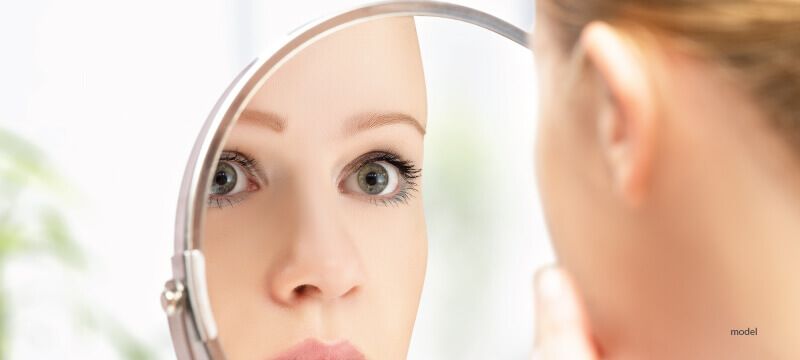Can Birth Control Pills Help with My Acne?

Many women will experience hormonal acne at some point in their lives. Hormonal acne is a type of acne that occurs due to imbalances in a woman’s hormone levels. This form of acne is easy to diagnose as it often occurs or worsens in the time period leading up to menstruation.
When most people hear the term hormonal acne, they instantly think of puberty. While the teenage years are often associated with acne, many women may continue to deal with hormonal acne throughout adulthood. For some, hormonal imbalances contribute to persistent acne even after perimenopause or menopause. Taking birth control pills may help clear up hormonal acne where topical creams or antibiotics have failed. Keep reading for answers to the most commonly asked questions regarding birth control and acne.
Hormonal Acne & Birth Control
Androgens are a group of hormones, including testosterone, that women normally produce in small amounts. These hormones trigger the production of sebum, the oil that clogs pores, may stimulate bacterial growth, and put you at high risk for breakouts.
Taking birth control pills that contain a balance of estrogen and progesterone reduces the number of androgens in the body. This can result in less sebum production, leading to fewer acne flare ups or less severe acne.
Which Forms of Birth Control are FDA Approved for Acne?
There are currently 4 forms of birth control pills approved by the FDA for use in treating acne:
- Ortho Tri-Cyclen: Estrogen + Progestin
- Estrostep: Estrogen + Norethindrone
- Yaz: Estrogen + Drospirenone
- Beyaz: Estrogen + Drospirenone + Folic Acid
Each of these pills contains a combination of estrogen and progesterone, which minimizes androgen levels. Along preventing pregnancy, research shows each of the above brands are effective in minimizing acne, with only negligible differences between them.
What Types of Acne Can Birth Control Help Clear?
Oral contraceptives minimize the production of sebum by reducing androgen levels. Less oil production may help clear blackheads, whiteheads, pimples and cystic acne even when other treatment methods have failed.
However, because oil production isn’t acne’s only contributing factor, your doctor may prescribe topical treatments or antibiotics in addition to birth control to help clear your skin.
How Quickly Does Birth Control Work to Clear Acne?
Your body typically takes 3 months to adjust to the hormones in birth control. This means it may be several months before you notice a difference in your skin. In the interim, it’s common to experience flare-ups as your body reacts to new levels of hormones.
If your current birth control is causing acne and you decide to switch brands or stop taking it, you might have to wait up to 3 months for your skin to clear.
Can Birth Control Pills Cause Acne?
Birth control pills that contain only progesterone may cause acne. This includes mini-pills which contain no estrogen. Progesterone alone can raise body temperature and increase sweating in addition to increasing sebum production. Combined, this often makes acne worse.
Lo Loestrin is a combination birth control pill that lists acne among its side effects, even though the pill contains both estrogen and progestin.
Potential Side Effects of Taking Birth Control for Acne
Birth control pills are not without side effects. Combination birth control pills, those that contain both estrogen and progestin, increase risk of the following:
- Heart attack
- Stroke
- Blood clots in the legs or lungs
- Gallbladder disease
- Liver disorders
- Nausea
- Dizziness
- Headaches
- Bloating
- Breast tenderness
- Bleeding between menstrual cycles
Women who smoke, have high blood pressure, have a history of migraines, diabetes, heart disease, liver disease or breast cancer and women who are breastfeeding should not take birth control for acne due to the increased risk of complications.
As with any prescription medication, its important to discuss the benefits and risks with your physician.
Can Other Forms of Birth Control Minimize Acne?
Any form of birth control that combines both estrogen and progesterone (or the synthetic progestin) can provide some beneficial effects when it comes to controlling acne. This includes the birth control patch and NuvaRing (however neither form is approved by the FDA to address acne).
Birth control methods that only contain progesterone or progestin may actually make acne worse, increasing the amount and severity of acne breakouts. This includes the birth control shot (Depo-Provera) and hormonal IUDs (Mirena).
Paragard, the copper IUD, contains no hormones and thus has neither a positive or negative influence on hormonal acne.
Tips for Clearing Acne with Birth Control Pills
To get the most out of your birth control pills when it comes to clearing your skin, stick to the following:
- Speak with your doctor about possible side effects and the various hormonal doses before choosing a pill for your acne.
- Tell your doctor about any other medications you’re using. Some (especially antibiotics) might interfere with the effectiveness of the pill, either as a contraception or for acne.
- Use the pills exactly as prescribed. Many pills containing hormones need to be taken at the same time each day for best results.
- Continue with your regular skincare routine and any other acne medications prescribed by your doctor. Birth control pills only help with one facet of breakouts.
If your acne is the result of excess oil production, combination birth control pills containing both estrogen and progestin may help decrease sebum production, resulting in clearer skin. Speak to your doctor about whether or not oral contraceptives are right for you.
There are also a number of ways to address hormonal acne without the use of birth control.
Disclaimer: The contents of the Westlake Dermatology website, including text, graphics, and images, are for informational purposes only and are not intended to substitute for direct medical advice from your physician or other qualified professional.
